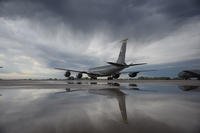A fifth U.S. destroyer has arrived in the eastern Mediterranean to boost U.S. firepower should President Obama order strikes against Syria to punish the regime of President Bashar al-Assad for its alleged use of chemical weapons, the Navy said Thursday.
The Stout is underway in the Mediterranean where the guided-missile destroyer will join the destroyers Ramage, Mahan, Barry and Gravely off the coast of Syria as part of the U.S. Sixth Fleet, said Lt. Lauryn Dempsey, a Navy spokeswoman.
Dempsey also denied regional media reports that the amphibious assault ship Kearsarge with 1,000 Marines aboard was also on station in the Mediterranean. "That is incorrect," said Dempsey, adding that the Kearsarge and two accompanying ships were currently in the Fifth Fleet's area in the North Arabian Sea.
The Stout left its Norfolk, Va., homeport on Aug. 18 and initially had been scheduled to replace the Ramage. The Mahan had been due to return to Norfolk last week but was ordered to stay in the Mediterranean following the Aug. 21 rocket attacks on the Damascus suburbs that humanitarian groups and rebel forces have said killed hundreds with the nerve agent Sarin.
The buildup of naval power came after U.S. military chiefs consulted with their counterparts on the crisis in Syria and the U.S. response.
Earlier this week, Gen. Martin Dempsey, chairman of the Joint Chiefs of Staff, and Gen. Lloyd Austin, head of the Central Command, met for three days in Amman, Jordan, with commanders from Saudi Arabia, Qatar, Turkey, the United Kingdom, France, Germany, Italy and Canada.
The Petra news agency in Jordan reported that the military leaders discussed regional security and implications of the ongoing crisis in Syria.
Recent statements from the White House and State Department have suggested that the question now for the U.S. was not whether to strike Syria, but when.
In a PBS interview Wednesday, Obama spoke in terms of a "limited strike" on Syria. "There need to be international consequences" for the actions of Assad's regime, Obama said, but several factors were involved in the timing of a strike.
United Nations technical teams were on the ground in Syria to search for evidence of chemical attacks and they were not expected to complete their work and leave Damascus before this weekend. The U.S. asked UN weapons to leave Iraq before launching the invasion in 2003.
Congress has also asked the White House to share intelligence on the evidence the U.S. has turned up on Syria's use of chemical weapons. Deputy Press Secretary Josh Earnest said Thursday that the White House has thus far "committed to sharing an unclassified version of the chemical assessment" with key members of Congress before the end of this week.
However, Earnest said that the "the report has not been finalized at the moment." Earnest stressed that the U.S. intelligence community was convinced that chemical weapons had been used in Syria and "we also know the regime alone has that capability." Russian officials had stated that rebel forces may have been responsible for the attacks.
There has also been growing support in Congress to delay a strike until the House and Senate return from recess next week and could take up a resolution to authorize attacks on Syria. On the House side, 116 members – 98 Republicans and 18 Democrats -- have signed a letter calling on the White House to wait for a vote.
"I definitely believe there needs to be a vote" to authorize strikes on Syria, Sen. Tim Kaine, D-Va., said on CNN. A vote would be "completely consistent with President Obama's prudence to this point" on the use of force, Kaine said.






























